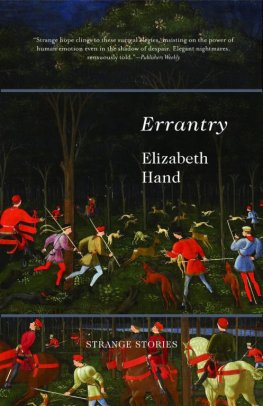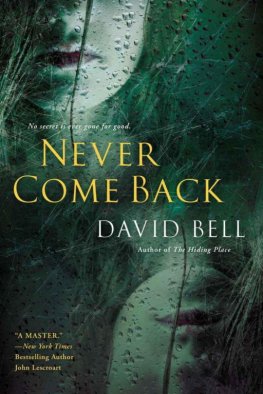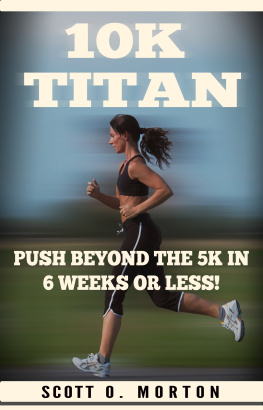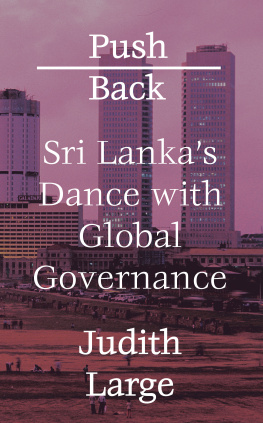Altmaier Elizabeth M. - Push Back the Dark
Here you can read online Altmaier Elizabeth M. - Push Back the Dark full text of the book (entire story) in english for free. Download pdf and epub, get meaning, cover and reviews about this ebook. year: 2017, publisher: Wipf and Stock Publishers, genre: Religion. Description of the work, (preface) as well as reviews are available. Best literature library LitArk.com created for fans of good reading and offers a wide selection of genres:
Romance novel
Science fiction
Adventure
Detective
Science
History
Home and family
Prose
Art
Politics
Computer
Non-fiction
Religion
Business
Children
Humor
Choose a favorite category and find really read worthwhile books. Enjoy immersion in the world of imagination, feel the emotions of the characters or learn something new for yourself, make an fascinating discovery.

- Book:Push Back the Dark
- Author:
- Publisher:Wipf and Stock Publishers
- Genre:
- Year:2017
- Rating:3 / 5
- Favourites:Add to favourites
- Your mark:
- 60
- 1
- 2
- 3
- 4
- 5
Push Back the Dark: summary, description and annotation
We offer to read an annotation, description, summary or preface (depends on what the author of the book "Push Back the Dark" wrote himself). If you haven't found the necessary information about the book — write in the comments, we will try to find it.
Push Back the Dark — read online for free the complete book (whole text) full work
Below is the text of the book, divided by pages. System saving the place of the last page read, allows you to conveniently read the book "Push Back the Dark" online for free, without having to search again every time where you left off. Put a bookmark, and you can go to the page where you finished reading at any time.
Font size:
Interval:
Bookmark:
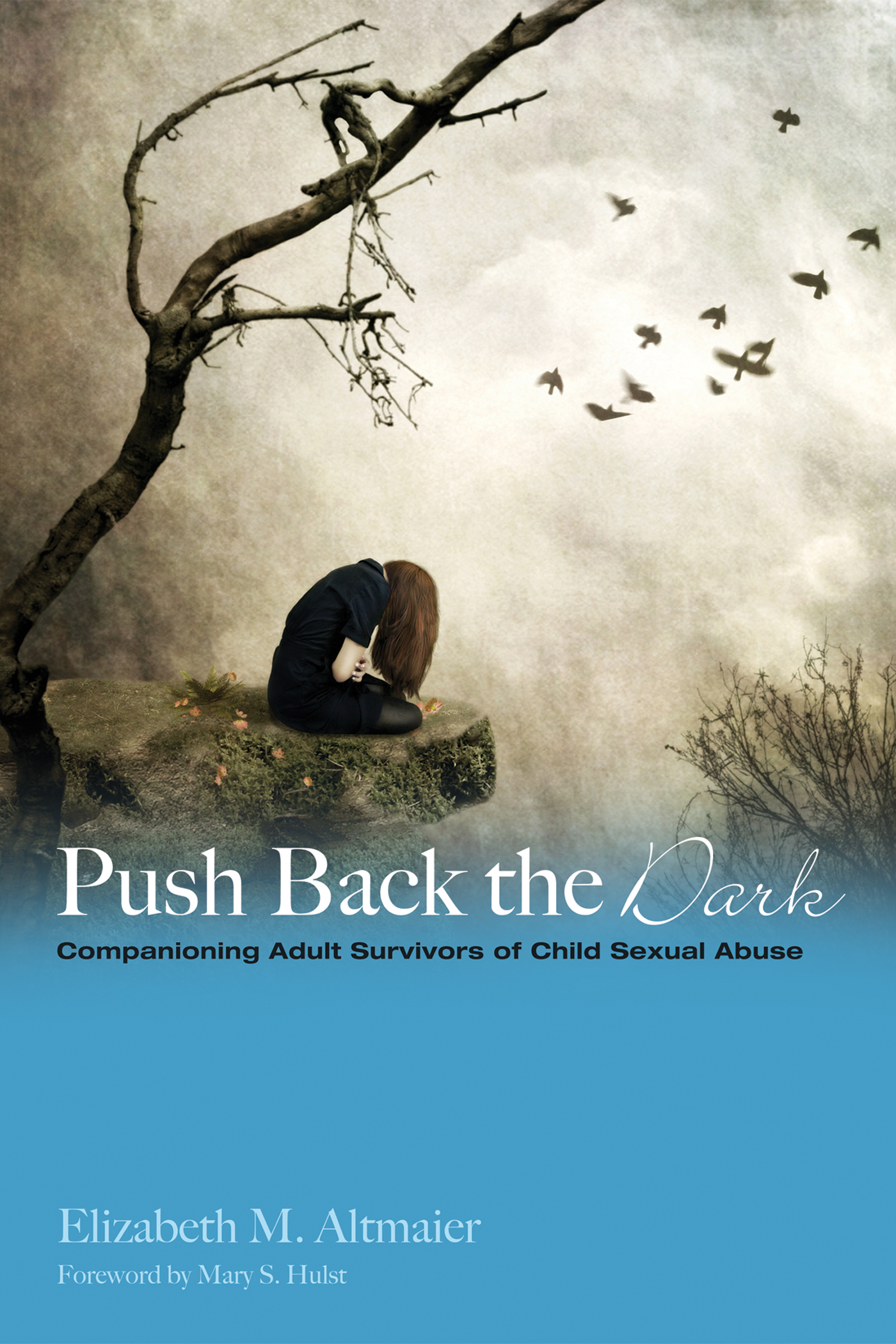
Companioning Adult Survivors of Childhood Sexual Abuse
Elizabeth M. Altmaier, PhD foreword by Mary S. Hulst

Chapter Objectives
1. Learn correct information about childhood sexual abuse, and stop believing wrong and misleading stereotypes.
2. Understand how sexual abuse during childhood damages every aspect of adult development, including spiritual development.
3. Gain sympathy for the background of what might appear to be willful, wrong actionsor lifestyle choices among adult victims.
4. Learn how to actively listen to victims stories.
5. Learn journey skills that you can assist victims to acquire.
I am a child in your congregation. I am the youngest child in my family and the only girl. When I am in grade school, I am just the cutest thing. My long hair is in pigtails or a ponytail, my dresses are adorable, and I have a bubbly personality. I have memorized more Bible verses than any other child my age, and I wear with pride my Sunday school attendance award each week. I go to a Christian camp each summer. As I get older, I volunteer in the church nursery. I announce that I want to be a teacher when I am a grown-up, just as my mother had been before she married.
I am a teenager in your congregation. It is rumored that I drink, use drugs, have sex, and run with the fast crowd at school. The high school boys in the churchs teen group are alternately attracted to and repelled by me, and they exchange glances and smirk in my presence. My behavior shames my parents, and you cant decide whether you should say anything to them or not. My parents, however, carry on as if nothing is wrong, so you decide against making things more difficult. They are still somewhat in control of me, you think, because I am in Sunday school and attend church each week. Perhaps its just a phase, you tell yourself. You are relieved when you hear that I will attend a prestigious Christian college where you are sure that I will get my life back on track.
I am a student at a prestigious Christian college. Because my attendance at daily chapel is enforced, I listen to hundreds of sermons over a four-year period, participate in numerous Bible studies, and even come forward to testify during a revival. Other behaviors contradict this appearance: in conflict with the colleges code of behavior, my hidden life revolves around substance abuse and illicit relationships. I am adept at living under the radar of behavioral expectations. Unexpectedly, I find comfort and a sense of belonging in my psychology major and my professors, and I begin to embrace a dedicated student role. Yet the darkness of my life continues.
I am an adult in your congregation. I attend regularly, and my financial contributions are above expectations. I am successful in my career and well known in the community. I greet you warmly every Sunday, and I regularly volunteer for church needs; but you are disturbed to realize that you cant decide whether you like me or not, partly because I dont fit the mold of women with whom you are comfortable. For one thing, I visibly relate more easily to men than to women. I look people directly in the eye, and I talk about sports and local politics. For another, I dont go to any womens Bible study group, and I am not a member of the group of women in your congregation whom you trust.
I am that little girl with the storybook upbringing, and I am a victim of childhood sexual abuse. The abuse began when I was a preschool child and continued into my elementary school years. That out-of-control teenager started drinking, using drugs, and having sexual relationships as a twelve-year-old. My teen years were desperatedark with confusion, depression, and anger. That prestigious Christian college that I attended? My parents forced me to go there, but my behavior continued unabated. In fact, it was in that Christian environment that I learned how to live on two levels. As an adult, my life continued on two parallel tracks: the outer woman was adjusted, competent, and high functioning and was able to combine her career with marriage and two children. The inner woman used substances excessively; had an array of psychiatric disorders including eating disorders, depression, compulsions, and panic episodes; and dealt with life through hypervigilance, workaholism, and obsessions about control.
I began this chapter with a brief introduction to me and to what I looked like to others. I did this because the aftereffects of childhood sexual abuse are misunderstood and often mislabeled.
Had you known me as a successful professional, you might have perceived me as being a perfectionist , which I was.
When I was a teenager, however, you would have encouraged your child to avoid me because I was sinful , which I was.
Your confusion about my inability to have normal friendships with you in college was understandable: I had no boundaries .
My own students suffered while they were trying to please me because I had become an unpleasable person the supervisor who could not be satisfied.
This chapter explains why childhood sexual abuse causes such a range of difficulties in life for many years after the abuse. The italicized writings are taken from a journal that I began keeping after I started treatment.
The Trauma of Childhood Sexual Abuse
Dread sits on my chest like a grey stone.
The light in the door slits open
And Death walks in
And I am frozen in place and time.
And that child is entombed in her aloneness.
How can I find her?
The scientific study of childhood sexual abuse as a specific category of trauma began in the late 1970s. In 1980, the American Psychiatric Association published a revised diagnostic guide with new categories of mental health problems such as post-traumatic stress disorder (PTSD). These categories of psychiatric disorders had been prompted, because professionals were treating Vietnam veterans who had returned from combat with pervasive and disabling mental health problems. None of the then-current mental health labels accurately captured these symptoms; mental health professionals thus began to describe veterans who had symptoms such as uncontrollable intrusive thoughts and pictures and enduring high levels of physiological arousal as being survivors of trauma . Previously, trauma had been limited to physical wounds. By using the term trauma in a psychosocial context, people were recognizing that trauma could by psychological as well as physical.
During the 1980s, public attention to other psychological traumasdomestic violence and childhood abuseincreased. Rape crisis centers began reporting on the use of their services by adults who described having been sexually abused as children. Memoirs that were written by child victims, now adults, were published. concluded that persons who experienced ongoing abuse in the context of their family (i.e., physical or sexual abuse) or during extremely stressful situations, such as captivity and hostage taking, had unique problems and needed as-yet-unknown treatment solutions.
All the attention that professionals and the public gave to these disorders resulted in differences of opinion on the most appropriate diagnosis of and treatment for adults who reported trauma symptoms that dated back to childhood. Media attention focused on adults who asserted that they were being falsely accused of child abuse, often by their adult children. Some professionals alleged that these memories of childhood abuse were false and that they were created by unscrupulous therapists who had implanted memories in their patients. False memories was a topic of vigorous public debate that was not limited to the United States: over a dozen organizations worldwide issued reports on this topic during the 1990s.
Font size:
Interval:
Bookmark:
Similar books «Push Back the Dark»
Look at similar books to Push Back the Dark. We have selected literature similar in name and meaning in the hope of providing readers with more options to find new, interesting, not yet read works.
Discussion, reviews of the book Push Back the Dark and just readers' own opinions. Leave your comments, write what you think about the work, its meaning or the main characters. Specify what exactly you liked and what you didn't like, and why you think so.

